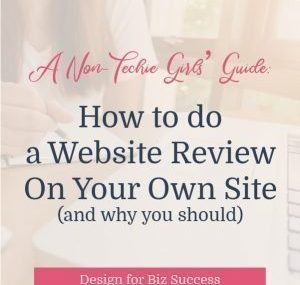As an online business owner, we all start at the same place…closing our eyes and clicking the “publish” button on our first DIY website and that first blog post. Remember that?
After a while your focus shifts to attracting visitors to your site, figuring out a social media strategy, and building your email list.
Eventually you’re ready. It’s time to offer your audience something to buy. Your very first product or service offering.
Now your little blog, your “cute little hobby,” is a business.
And throughout all of it, there’s been an “inkling” in the back of your mind that there’s probably some legal stuff you should check into, right?
As time goes on, this inkling starts to grow. It can build to the point of stressing you the heck out! Maybe even keeping you up at night.
The “what ifs” monster is knocking on your door. What if…
- I get sued for the advice I give on my blog?
- Someone steals my course name?
- Someone copies my work?
So you write “find a lawyer” or “find out what legal stuff I need” on your never-ending “To Do” list, but it gets bumped down the list month after month.
Most people I talk to describe something like this story. Some are even so paralyzed by fear when it comes to this topic that they stay stuck or worse yet…never even start at all.
I don’t want that to happen! I want you to follow your dreams and build a successful business that allows you and your family to live the life you’ve always wanted.
So, it is my mission to help take some of the fear and overwhelm away! It doesn’t have to be so scary, it really doesn’t.
Learn what legal issues apply to your business, then take it one…step…at a…time.
Let’s get started!
Legal Notices Every Website Needs
PRIVACY POLICY
Most states and countries require by law that a Privacy Policy be posted on every website. It describes how you protect the personal information you collect from your site visitors as well as data collected through third party sites for website analysis (such as Google). It is also required to run ads on Facebook and other online media.
You may have heard about the new GDPR changes that will come into effect May 25, 2018. These rules come out of the EU, but if you’re an online business owner or simply use digital marketing in your business this DOES apply to you.
As of May 25 you need to post a GDPR-compliant Privacy Policy on your website. There are a few other steps you should take to be compliant with the new law as well. There are many resources out there for getting these questions answered, but if you’d like a quick overview you can watch my video on this issue on my Facebook page.
TERMS & CONDITIONS
A companion document to the Privacy Policy is the Terms & Conditions. They set up clear expectations for your site visitors to know what’s expected and allowed and what is not.
Your Terms will include disclaimer language and copyright notices as well as well as many other topics that protects both YOU and your site visitors. It’s not required by law, but it is an important piece of your legal foundation.
DISCLAIMER
A Disclaimer is an attempt to limit your liability for the services or advice you provide to a client, customer, or site visitor. There are a variety of types covering medical and health fields, affiliation with others, professional advice, earnings disclaimers, and some basic ones always included in contracts.
Why do these notices matter?
Like I stated above, the Privacy Policy is required by law (with some pretty hefty fines!). So if you’re doing business online you fall under the laws of other states and even countries. It’s a pretty simple process to post them on your site. It can also be quite painful if you don’t and get caught.
Your Terms & Conditions protects both you and your site visitors. It is different and separate from any Terms you use for your paid courses, programs, or products. This document should be posted on every individual website.
While nothing is 100% guaranteed, Disclaimers give notice to your clients, customers, and site visitors that you can’t be held liable for the choices they make in their lives and businesses. However, if a court finds that you were negligent in any way, the disclaimer won’t likely protect you. It’s not a “free for all” coverage of anything and everything you may do. It’s meant to protect your normal course of business, done with integrity and competence.
Options for Getting Your Legal Notices Posted on Your Site
I have a super cool Template Shoppe with these website notices basically done for you. They’re also updated to comply with the GDPR laws.
I didn’t want them to be one-size-fits all since every business is a little different. With each document you’ll get a short training video. These easy to follow videos show you step-by-step how to customize the agreements to suit your needs and be a perfect match for YOUR biz! You can also find other template options online or hire an attorney to write your custom documents for you.
Taking the time now to build strong legal foundation for your business can save you a lot of time, money, and hassle later.
I know, I know…YUCK! You don’t want to deal with this stuff.
It’s confusing.
It’s boring.
It’s scary.
But think of it as preventative medicine. It’s much worse to end up in court about to lose all of your assets and to know you could’ve done something about it long ago.
Of course, there are never any guarantees when it comes to the law. You can never completely avoid the possibility of someone suing you. BUT, you can take the steps now to make sure that if that does happen. You will come out of it as painlessly as possible.
And more importantly, using contracts helps to build and maintain your business relationships. If you have the details neatly laid out for everyone to refer to, many conflicts can be resolved quickly and easily. And even if you decide to “part ways,” your relationship can be maintained for potential opportunities in the future.
“Avoid lawsuits beyond all things; they pervert your conscience, impair your health, and dissipate your property.” ~Jean de la Bruyere
Once you get your documents, you need to post them on every page of your website. The easiest way to do this is to create a separate page for each document.
Next, add a link to each of those pages in your footer (which should appear on every page). You can see an example of that right here on Entwine Web Design.
Please note, this is not an exhaustive list of any and every legal issue that may affect your business now or in the future. You should consult with a local lawyer who can become an important member of your team as you build and grow your business. And remember…while I do like you a whole lot, I am not your lawyer. The content provided here is for educational and informational purposes only. We are not forming an attorney-client relationship. Good luck!
About Karen Taggart
Karen Taggart is the founder of BizLaw™ where she provides legal and business strategy for online entrepreneurs. She helps business owners feel confident and protected. She teaches the basics of business law, lays out a clear legal strategy, and provides the legal contracts entrepreneurs need to go pro. Karen has been featured on numerous podcasts, as a guest expert in many courses and programs, and serves as a guest mentor for Amber McCue’s Freshly Implemented program. Karen is also the creator of the BizLaw Basics mini course, The Template Shoppe, and the BizLaw VIP Club. You can find her at: karen-taggart.com
Disclaimer from Amy: Some of the links in this article are affiliate links which means that I will earn a small commission for any purchases you make using the link. This post is designed to educate and encourage you in your website endeavors, but this is also my business, which is a for-profit endeavor! As you build your own website and business, I encourage you to also explore affiliate opportunities to help offset the costs of your website.





